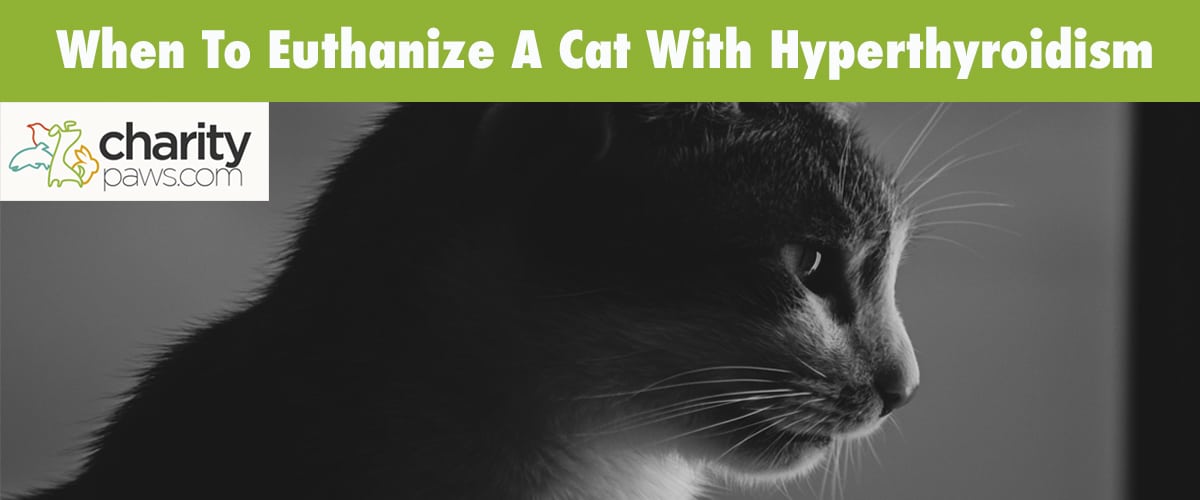Hyperthyroidism is a health condition seen often in older cats.
With about 10% of all cats over the age of 10 developing the disease, this is a topic that all cat owners should be well versed on.
Though many cats can be well managed with the use of long term treatment, some cats will develop significant complications from the effects of their hyperthyroidism.
Due to this, it’s important to be aware of the signs of a cat suffering from their disease.
In this article we will not only discuss the details of hyperthyroidism in cats, but also the many health complications this disease can cause.
We will aim to answer the question of how this condition can impact your cat’s life, as well as when it may be time to say goodbye.
What Is Hyperthyroidism In Cats?
Hyperthyroidism in cats is a condition that refers to the overproduction of thyroid hormones from the thyroid gland.
This gland is located in a cat’s neck, and often becomes enlarged as their hyperthyroidism progresses.
The thyroid gland plays a key role in a cat’s metabolic process, so an overproduction of thyroid hormones leads to an increased metabolic rate.
Thyroid hormones impact almost all feline organs, so this disease can cause damage to multiple body systems.
The enlarged thyroid gland is typically a result of a benign adenoma, but a small percentage of cases involve a cancer known as adenocarcinoma.
The exact cause of this disease is still unknown, but a cat’s diet is believed to play the most significant role.
If your veterinarian suspects hyperthyroidism in your feline friend, they can easily perform a TT4 test that searches for elevated thyroid hormone levels.
Based on the results of this test, your vet can offer your cat a proper diagnosis.
Are Some Cats More Prone To Hyperthyroidism?
There is not yet a tie to any specific breeds of cat in terms of hyperthyroidism, but age seems to be the most common factor that each cat has in common.
About 10% of cats over the age of 10 will develop hyperthyroidism, making this the greatest risk factor to be aware of.
In addition to age, some experts believe that exposure to high dietary iodine levels in their food can lead to hyperthyroidism in some furry friends.
However, this is still being researched.
What Are The Symptoms Of Hyperthyroidism In Cats?
If your feline friend has developed hyperthyroidism, there are a list of symptoms that you may see present in their daily lives.
To help you better spot this condition from the moment it develops, let’s list some of the most common clinical signs below.
Some of the most common symptoms of hyperthyroidism in cats include:
- Weight loss
- Dull fur
- Unkempt appearance
- Increased appetite
- Increased thirst
- Increased urination
- Vomiting
- Diarrhea
- Behavioral changes
These symptoms may be subtle at first, but they will typically worsen as time goes on without medical management.
If your cat is displaying any of the signs of hyperthyroidism, we suggest having them seen by your veterinarian for proper testing.
Complications Of Hyperthyroidism In Cats
As we mentioned above, a cat’s thyroid hormones impact virtually every organ in the body.
With almost every organ being influenced by these hormones, this means many body systems will be impacted by hyperthyroidism.
Ranging from cardiac complications to blindness, unmanaged hyperthyroidism can deeply impact a cat’s quality of life.
Significant Weight Loss
Increased thyroid hormone levels will lead to an increased metabolic rate in cats.
This will not only cause a cat to lose a significant amount of weight, but they will often have an insatiable appetite.
If a cat loses too much weight, this can deeply impact their overall health.
Blood Pressure
Many cats with unmanaged hyperthyroidism will develop high blood pressure.
This can occur due to an increase of pumping pressure from the heart, often as a result of underlying cardiac disease.
This can not only cause a cat to feel ill, but it can even lead to retinal detachment and blindness if left untreated.
About 25% of cats with hyperthyroidism will develop high blood pressure, so it is a realistic threat for these cats.
Cardiomyopathy
Thyrotoxic cardiomyopathy develops in cats due to the pressure of an increased metabolic rate.
Hyperthyroidism can cause the heart to enlarge and thicken, making it more challenging to function properly.
If this is left untreated, this can lead to failure of the organ over time.
As you can see, hyperthyroidism is much more than a disease that simply causes weight loss or an increased appetite.
If this condition is left untreated for too long, your cat’s health can be significantly impacted.
Can You Treat Hyperthyroidism In Cats?
Thankfully for our feline friends, less than 2% of thyroid growths are actually cancerous.
This means that with proper medial management and adherence to your cat’s treatment plan, most cats are easily managed for long periods of time.
Though every case will vary, there are a few different treatment options that your veterinarian can explore.
Before starting any forms of treatment, your veterinarian will likely suggest an array of diagnostics to assess their current state of health.
This can include a full panel of blood tests, blood pressure measurements, ECG, urinalysis, and radiographs.
Based on the results of these diagnostics, your vet can determine the best plan of action going forward.
Medication
A medication known as methimazole is a common treatment method for hyperthyroidism in cats.
This medication does not impact the excess thyroid tissue itself, but rather blocks the excess thyroid hormone from being produced.
This means that the cat will need to take the medication daily for the rest of their life.
Your cat will also need to be monitored closely by your veterinarian, as their medication levels may need to be adjusted periodically.
Surgery
If your veterinarian believes that surgery is a suitable option for your cat, they may explore surgical removal of the affected thyroid gland.
Most cases of hyperthyroidism only impact one thyroid gland, meaning only one gland will need to be removed.
While this can be effective for many cats, it can only be accomplished in cats that are otherwise healthy.
Your cat will typically need to be on thyroid medication for weeks prior to their procedure to manage their symptoms, as well as undergo extensive testing to rule out any secondary organ damage ahead of time.
In addition to the care before surgery, you should be prepared for your cat to stay in the hospital for a few days after their procedure.
Radioactive Iodine
If you have access to a clinic that offers radioactive iodine therapy (I-31), this may be a great option for your feline friend.
I-31 therapy helps to destroy any excessive thyroid tissue that is present around the thyroid gland, all without impacting other body systems.
Keep in mind that your cat will need to stay in the hospital for up to 2 weeks while this treatment is administered, and your cat will need to be deemed otherwise healthy before the process begins.
Prescription Diet
Some veterinarians will recommend offering a prescription diet that is created for cats with hyperthyroidism.
These diets are iodine limited, and potentially help in tricking the body out of creating excess thyroid hormones.
However, these diets only work if no other food is being consumed.
Even treats will need to be removed from your cat’s menu.
Every case is different, so we suggest trusting your veterinarian’s advice when it comes to the treatment of your feline friend.
How Long Can A Cat Live With Hyperthyroidism?
If your cat had just been diagnosed with hyperthyroidism, you may be wondering how much time you have left with your beloved companion.
It’s important to realize that when the disease is caught before any significant organ damage has occurred, most cats have an excellent prognosis.
When following the treatment guidance of your veterinarian, many cats will even live as long as a cat free of the condition.
Things can get a bit more complicated if your cat has developed cardiac disease or high blood pressure, as well as whether or not they have any other underlying conditions.
Even still, many of these conditions can be managed long term with the help of your veterinarian.
Signs Of Late Stage Hyperthyroidism In Cats
As with any other medical conditions we discuss, every case of hyperthyroidism in cats will vary.
While some will be easily managed with long term care, others will fail to respond to any form of treatment.
This can occur if their disease is not caught early, substantial organ damage has already occurred, and even if an owner cannot pursue treatment for any reason.
If any of these reasons fit your cat’s situation, you will need to be aware of the signs of late stage hyperthyroidism in cats.
Some of the most common signs of a cat suffering with hyperthyroidism include:
- Significant weight loss, no matter how much they eat
- Increased heart rate
- Changes in behavior such as vocalizations, agitation, and restlessness
- Chronic diarrhea
- Chronic vomiting
- Fur loss
- Muscles tremors or spasms
If your cat with hyperthyroidism is experiencing any of the above symptoms, it may be time to discuss quality of life with your veterinarian.
Your vet has the tools needed to either suggest the next treatment option available, or discuss the possibility of saying goodbye.
When To Euthanize A Cat With Hyperthyroidism

If you are wondering when to put a cat to sleep with hyperthyroidism, you likely have a furry friend in your home that you believe could be suffering.
This is a decision that only you and your veterinarian can make, as nobody else understands the details of your cat’s situation.
However, if you feel like your cat is experiencing more bad days than good, it very well could be time to say goodbye to your beloved furry friend.
If your cat is experiencing the symptoms we discussed above and appears to be struggling day to day, it may be the kindest decision to let them go.
If this is new to you and you don’t know how many good days vs bad days your cat is having, get a calendar and start keeping track.
A calendar will help you see how many bad days your cat is having and will actually show you their current state of being.
Again, this is a decision that only your veterinarian can help you make, so we suggest speaking with them in detail.
Final Thoughts
Hyperthyroidism is a condition that can deeply impact a cat’s life without proper treatment.
This disease can lead to suffering if it cannot be managed for any reason, leading to the need for some owners to say goodbye.
If you think your cat with hyperthyroidism is struggling with their disease, we highly suggest reaching out to your vet for guidance.


Thank you! This article is soooo helpful! We are looking at whether to say goodbye to our 20 year old girl named Baby. I’ve been watching her good days and bad days but now she is moving into the later symptoms you listed. We are thankful for the info our vet has provided and for good articles like this.
Thank you for the information. My 18year old female cat has been taking Thyronorm for 2 years. She was attacked a month ago, & suffered bites & fear. She remains indoors, has picked up well after meds, but will not eat today. She swallows like she has something in her throat when just sat upright. Due back to vet in 2 weeks.